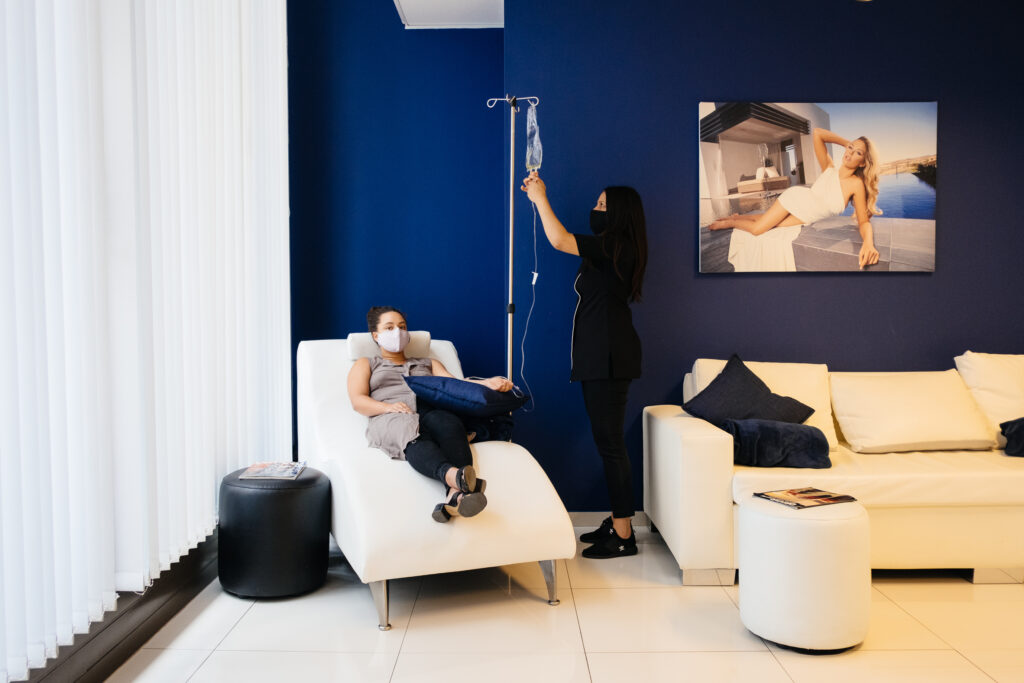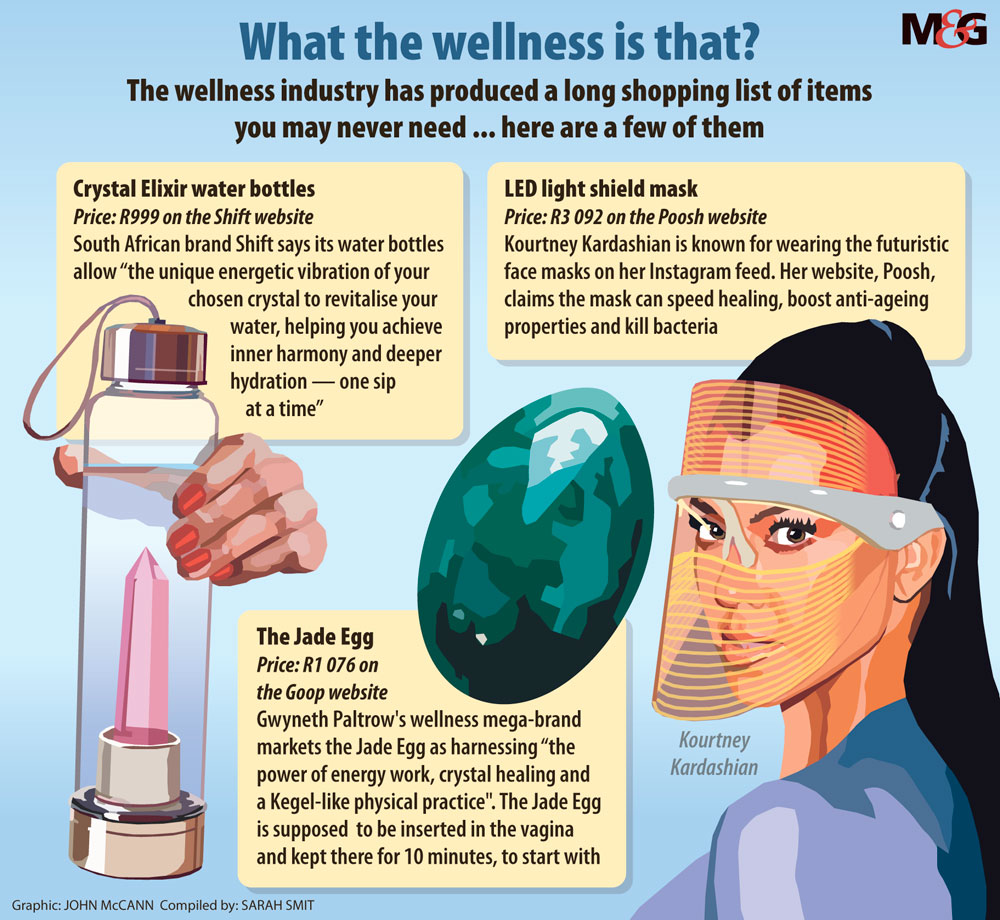‘It all depends’: Reviv CEO Sayed Mia says some doctors call IV drip treatments “expensive pee”, but he argues it’s a great source of vitamins if your diet is poor. Photo: James Puttick
The waiting room of the Reviv medical spa in Sandton is scentless, save for the odd whiff of the fruity alcoholic smell of the hand sanitiser that greets its guests as they enter.
Here, smack-dab in the centre of Johannesburg’s playground for the corporate elite, influencers and celebrities come to get plugged into intravenous (IV) drips that pump vitamins straight into their veins. The experience is somewhere between rock ’n roll and Black Mirror.
Intravenous vitamin therapy is one of the more flashy wellness trends to have gained popularity in South Africa. It is marketed as enhancing the cosmetic appearance and wellness of clients. Purveyors of these treatments cite the 100% vitamin absorption rate as a reason why the IV route trumps oral supplements.
 Hooked up: Sarah Smit getting intravenuous health treatment at Reviv in Sandton, Johannesburg. (Photograph: James Puttick)
Hooked up: Sarah Smit getting intravenuous health treatment at Reviv in Sandton, Johannesburg. (Photograph: James Puttick)
Last week, on Reviv’s five-year anniversary in South Africa, influencers punted its treatments on social media, offering their followers a 10% discount. Reviv’s most expensive treatment, the Royal Flush — “designed to supercharge recovery and maximise your wellness” — goes for almost R3 000.
Though clients describe a near-instant boost to their energy and mental endurance, dietitians say the cons of IV vitamin therapy outnumber its supposed benefits. On top of having little in the way of clinical studies to back up their long-term efficacy, dieticians warn that these treatments could be dangerous.
After being poked and prodded by the most gentle of nurses, Reviv’s clients are escorted, drip in tow, to the relaxation area, designed to strike the balance between a futuristic doctor’s room and a spa. There clients have the option of watching the yellow liquid slowly trickle down a tube into their arm, or watching the TV, which plays a promotional video on repeat. The whole ordeal lasts less than an hour — the perfect lunch break pick-me-up for the suits beavering away in their Sandton offices.
On Wednesday, when the Mail & Guardian visited Reviv, its chief executive, Sayed Mia, bounced around the spa, his disposition perhaps an effect of his weekly “dripping”. Decked out in Balenciaga, Mia jokes that having two young children means that the treatments have become a vital part of his routine.
Mia discovered IV vitamin therapy in 2014 after a friend’s hangover was apparently cured at Reviv’s medical spa at the MGM Grand in Las Vegas. Reviv has 94 spas in 30 countries.
 21 October 2020. Sarah Smit getting intravenuous health treatment at Reviv in Sandton, Johannesburg. (Photograph: James Puttick.)
21 October 2020. Sarah Smit getting intravenuous health treatment at Reviv in Sandton, Johannesburg. (Photograph: James Puttick.)
On the effectiveness of the treatments, Mia says: “My system is different to yours. It all depends on your lifestyle. It depends on how depleted your system is. So let’s put it this way: if you go to your Dis-Chem or Clicks and you buy oral vitamins, you lose about 60% or even more through your digestive tract, whereas with an IV, you get 100% in your bloodstream.”
Keri Rudolph, the founder and chief executive of the IV Bar franchise, says she got into dripping with her doctor but wanted to improve on an otherwise clinical experience. Over the past three years, Rudolph has opened 12 spas. “It’s amazing,” Rudolph says about the effectiveness of the treatments.
“Some people will feel it immediately. They will turn around and say: ‘Ooh, is it placebo?’ It’s not. Most of us are dehydrated… And the vitamins and minerals, it is everything that you make in your body or what you get from food. That is why it is so safe,” Rudolph says, speaking a mile a minute over the phone.
“But the problem is what we eat nowadays. We don’t always have healthy lifestyles, we are stressed, we exercise a lot, so we are depleting our vitamin reserves very quickly. So people really, really feel it.”
Bad science?
Experts are not convinced of the supposed benefits of IV vitamin therapy and how necessary it may be, especially in developed countries.
Irene Labuschagne, a principal dietitian at the Nutrition Information Centre of the University of Stellenbosch, said IV vitamin therapy has been used in the medical profession for decades. In hospitals, it is commonly used to administer essential nutrients if there is an issue with gut absorption or long-term difficulty eating or drinking due to surgery, she said.
The treatments created and administered at medical spas are not supported by scientific evidence, Labuschagne added. “There have been no clinical studies to show vitamin injections of this type offer any health benefit or are necessary for good health.”
She added that the best strategy to promote health and reduce the risk of chronic illnesses is choosing to eat a wide variety of foods that are rich in nutrients.
Retha Harmse, who is a registered dietitian and the spokesperson for the Association for Dietetics in South Africa, agreed. “There is a saying in the dietetic world that rings: ‘If the gut works, use it.’ And there is a reason for that. As a dietitian, our last line of defence in hospitalised patients is intravenous feeds… Since there are risks involved, this is prescribed under strict medical supervision.”

Harmse added that receiving vitamins through an IV drip might have a higher absorption rate than through foods, however, your body can only absorb what it needs and what may be lacking. The rest will be eliminated.
Labuschagne and Harmse both noted that there are risks involved in getting the treatments, because you can have too much of a good thing. “Administering doses of vitamins above the recommended daily allowance might not only be a waste of money, but may also be dangerous as certain vitamins can have adverse effects when consumed in extremely high doses,” Harmse said.
Responding to these concerns, Mia said he agrees you can get all the vitamins you need from a well-balanced diet. “If you eat like a rabbit, [but] let’s be honest. We don’t have the time to do that.” On the risks involved, he said: “It all depends on what conditions you have, if any.”
Before getting the IV treatment, you are asked to fill out a health evaluation on an iPad.
“Sometimes it’s out of our hands. There may be a bit of scarring where the IV was administered, if you’re not dealing with a professional… So the dangers are very low,” he said.
“You know you can’t overdose, because the vitamins will just pass through the system. That’s why some of the doctors who are very sceptical will call it expensive pee.”